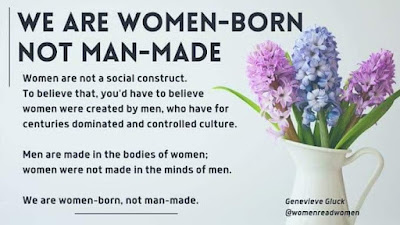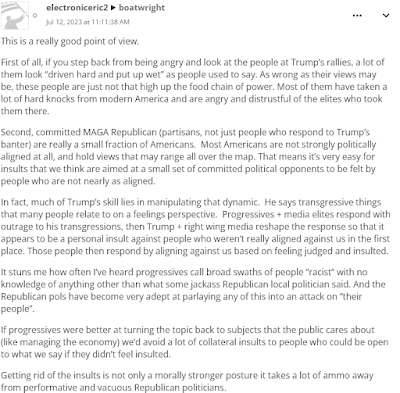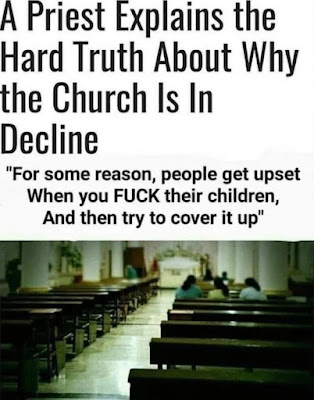Well, I've just seen the new
Barbie film, my first trip out to an actual theater since quite a while before the pandemic.
This post contains spoilers, so if you prefer to skip over it without reading and go to the one below, click
here.
First off, contrary to the impression created by the trailers and so forth, this
isn't just a movie of zany hijinks set in a benign dollhouse world. There is a fair bit of that at the beginning, and the inherent silliness of a world whose inhabitants and artifacts are actually just toys is sustained throughout (for example, a battle is fought with weapons like frisbees and arrows with suction cups on the ends instead of arrowheads), but the themes explored quickly become serious, even challenging.
Second, this is probably the most bizarre and original movie I've ever seen that still manages to achieve genuinely coherent, easy-to-follow storytelling. At various times, even in the midst of hot pursuit, our characters suddenly
shift from wherever they are to someplace that looks like it doesn't
even belong in the same universe. I can see why the film is sometimes compared to
Pleasantville (another favorite of mine), not because it's actually very similar, but because both movies focus on an almost-impossible-to-describe relationship between the real world and a fantasy world derived from it, and on the effects of the one intruding into the other -- though in
Barbie the intrusion goes both ways.
When I say "coherent storytelling", that doesn't mean it's done entirely in the way you're used to seeing in movies. At first the jumps from scene to scene seem jarring, linked only by brief narration, but you get used to it -- perhaps it reflects the way children actually play with toys, following storylines of their own imagining while simply leaving out anything that doesn't interest them.
The overarching theme is the contrast between female-dominated Barbieland and the male-dominated real world. Of course, an actual female-dominated society wouldn't just be a mirror-image of the real world, because men and women really are different -- and that's the case here. Barbieland's males suffer not from oppression but more just benign neglect; they feel not exploited but merely superfluous.
The film is complex and multi-layered. Without going into too much detail, Margot Robbie's "Stereotypical Barbie" character must travel from Barbieland to the real world, with Ken (Ryan Gosling) tagging along. They find the real world unexpectedly strange, not least because of male domination (yes, the term "the patriarchy" is overused, but with satirical intent). Ken decides that he likes "the patriarchy" and manages to install a (rather silly) version of it back home in Barbieland, though only briefly. A woman from the real world, Gloria (America Ferrera, who almost steals the show) is inspired by Barbieland's plight to discover her inner revolutionary, delivering a
fiery feminist speech which has gone viral and may become the movie's defining moment, though I have a feeling it will afford many male viewers and critics an unparalleled opportunity to nit-pick and miss the point.
Robbie and Gosling do an awesome job embodying their characters, and director Greta Gerwig is definitely someone to watch. Despite how it may sound here, Ken is not a villain. He's too naïve for that, and his resentments are shown to be well justified.
After Gloria, Barbie, and their allies overthrow Ken's amateurish patriarchal regime, the film proceeds to a long (a bit
too long, to be honest) series of scenes where various characters grapple with the profound existential issues the preceding events have forced them to confront. Right-wing critics who accuse the film of being "woke" are not only wrong (it isn't preachy or constantly throwing explicit identity politics in your face) but hopelessly superficial. The film doesn't offer easy answers, and avoids the standard clichés -- love
isn't always the answer, and Barbie and Ken don't get romantically involved, as would have been inevitable in a more conventional storyline. The film is not anti-men. Yes, it pokes fun at men, but it pokes fun at
everything.
Despite all these "heavy" themes, the movie is both very funny and aesthetically awesome. Yes, Barbieland is every bit as beautiful and weird as
this video suggested, but under Ken's brief male-centric rule, the same settings become
hideous, with beer and flatscreen TVs and macho kitsch everywhere. There are also some excellent songs, notably the initial "Pink" which helps ease you into this bizarre world.
(Yes, I know there is a trans actor in the film. This is consistent with the source material, since there was actually
a trans Barbie doll. The issue of transgenderism is never explicitly mentioned. It's not that kind of movie.)
This is not a film for ideologists. If you watch it with what I call a checklist mentality, checking off which aspects of it are consistent with leftist politics and which are not, you're wasting your time watching it at all -- because, again, it's not that kind of movie.
A minor criticism -- there's too much crying. Yes, Barbie has lived all her "life" in an unchanging utopia where she's never needed to deal with an actual problem, so it's not surprising that, while in the real world, she can be reduced to tears by a bratty teenager's string of tired and clichéd insults (ending, of course, with "fascist"), but there is too much giving up and bursting into tears in response to challenges. It's Gloria, toughened by life in the real world, who inspiringly rises to the occasion and displays unexpected abilities. The same could be said of "Weird Barbie" (Kate McKinnon), an outcast who has had to fend for herself and learn to think. Even Gloria's daughter (that same bratty teenager) quickly adapts to her strange new situation and shows real character development.
I would encourage everyone with any interest in these kinds of themes, or in movies generally, to see this. I'm not surprised that it has been enormously successful with audiences so far. Indeed, I now feel some hope that the success of
Barbie and
Oppenheimer and
Sound of Freedom means that American film is finally emerging from the long dark age of franchises and superheroes and remakes and reboots in which it has been mired for what seems like forever. Whatever you think of those three movies, there's no denying that they're fresh and new and original and different -- indeed, very different even from each other. This is new green growth in the wasteland; it's what our culture needs.


































































